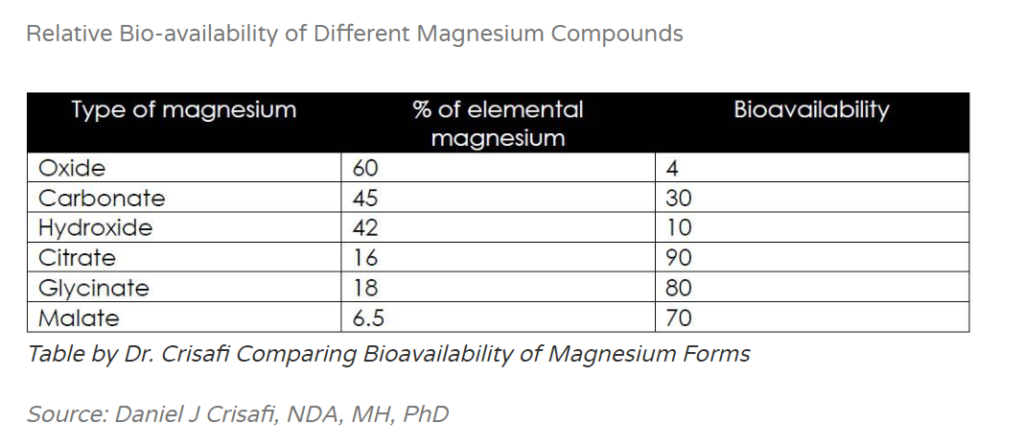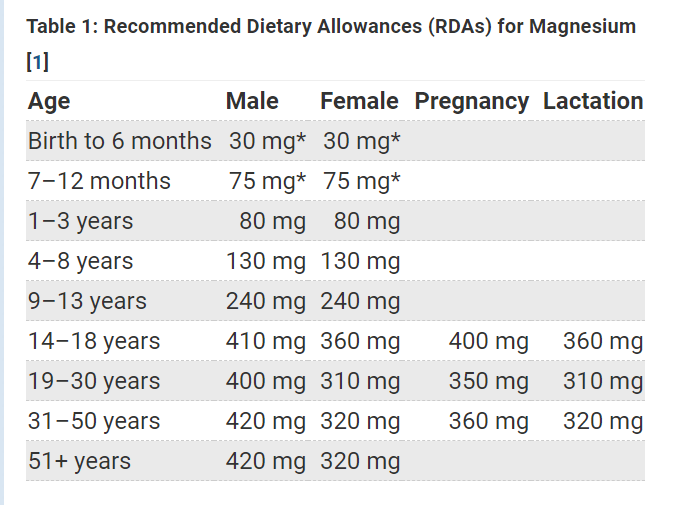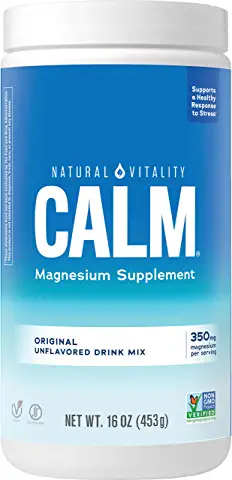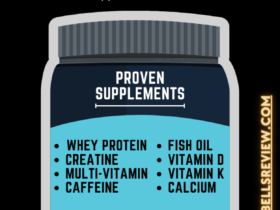From helping with stress relief to aiding muscle recovery, magnesium chelate is a rather new to the “must-have” list of supplements for maximum health and wellbeing. But what is it and why should you consider adding it to your daily routine? Find out why everyone from athletes to busy parents have added this essential mineral to their lifestyle – and discover the difference that this simple tweak can make in your life!

Quick Overview - - Magnesium is found within every cell in the body and used to 600+ processes - Magnesium comes in different forms or types via chelation - Type chelates have different properties and effects - Magnesium citrate, glycinate, and malate are typically used for general health supplementation - Magnesium has a range of potential benefits with minimal side effects for most
Why magnesium?
Magnesium is the fourth most abundant mineral in the body, is found within every cell, and plays an important role in over 300 metabolic processes. In fact, it’s vital for the human body to function properly. Nonetheless, studies suggest that approximately 50% of U.S. adults get less than the recommended daily amount of magnesium.
It has a wide array of biological functions, including maintaining healthy bones and teeth, regulating blood sugar levels, supporting cardiovascular function, reducing inflammation and providing relief from stress and anxiety. It also aids in the conversion of food into energy and helps with nerve and muscle function such as cramps or pain.
What is chelation and why Magnesium Chelate?
Chelation is a process that binds minerals with organic compounds to improve their stability and absorption. This makes it easier for the body to transport these minerals across the intestinal wall and utilize them more effectively.
So, the chelated form of magnesium is magnesium that has been bound to an amino acid 1 typically to glycine molecules…and sometimes called magnesium amino acids chelate or protein, making it dramatically easier for the body to absorb.
Since the chelation process can be done with various compounds, there are many different forms of chelated magnesium or magnesium amino acids chelate many of which are covered below.
Types of Chelated Magnesium
Magnesium supplements come in the form of compounds in which the magnesium ion (Mg2+) is chelated with another compound to maintain the mineral ion in a stable form more suitable for consumption.
That process produces different chelated forms such as carbonate, citrate, glycinate, and others. Glycinate and citrate are among the most common types of chelated magnesium, known for their high bioavailability and easy absorption. This form has been linked to benefits such as improved sleep quality and mental clarity, making it a popular choice for people looking to improve their overall energy levels.

Magnesium carbonate is another type of magnesium chelate that is known for its laxative effects, making it a popular choice for individuals suffering from constipation or digestive problems. It can also help reduce occasional heartburn associated with digestive issues.
Another form of magnesium chelate is magnesium oxide – a salt based form of magnesium that, unlike the others, does not bind to amino acids but instead is bound to oxygen molecules. Unlike glycinate or citrate, magnesium oxide offers no noticeable improvement in digestion or sleep quality, but its high concentration makes it useful for treating deficiencies in patients who need to increase their daily intake quickly.
Finally, there’s magnesium sulfate – commonly referred to as Epsom salts – which combines both magnesium and sulfur molecules into one compound. Commonly used as a bath salt or added to hot baths for muscle relaxation, Epsom salts are also used for Horticultural purposes due to the sulfur content helping plants absorb essential nutrients from soil more effectively.
Health Benefits of Magnesium (and chelates)
As mentioned above, magnesium offers a variety of health benefits:
- Energy production and exercise performance: magnesium helps convert foods into energy. While there is some conflicting info, some studies (Study 1, Study 2) suggest that it helps exercise performance especially if you are deficient.
- Brain function: may combat depression as low levels are linked to an increased risk
- Blood sugar regulation: may improve blood sugar levels, insulin sensitivity, and other risk factors for type 2 diabetes. One study found that almost 50% of people with type 2 diabetes have low blood levels of magnesium.
- Improved sleep: there are various studies that look at the impact on sleep but in this study nearly 4,000 adults linked increased intake to improvements in sleep, both quality and duration
- Reduced anxiety: it may help treat or even prevent anxiety. For example, one study in 3,172 adults associated increased magnesium intake with a lower risk of depression and anxiety
- Bone health: one study associated lower levels of magnesium with a higher risk of osteoporosis, a condition that causes bones to become brittle and weak
- Protein formation: creating new proteins from amino acids
- Muscle movements: aids in muscle contraction and relaxation
- Nervous system regulation: regulating neurotransmitters, which send messages throughout your brain and nervous system
And chelated magnesium in particular has benefits over regular magnesium:
- Is gentler on the stomach
- Improved stability and bioavailability; more “useful” to the body
Common Side Effects
When taken in correct and recommended dosages, magnesium chelate generally has few, if any, side effects. However, in some cases higher dosages may cause mild stomach issues such as nausea or diarrhea. It is also possible to experience an allergic reaction to the supplement itself.
…And Safety Precautions
When taking magnesium chelate, there are several contraindications – or drug interactions – to consider. For example, those on antibiotics should be careful when (and if) to take magnesium.
Those on bisphosphonates generally used to treat osteoporosis should be careful. Finally, individuals taking certain medications such as diuretics or PPIs 2 proton pump inhibitors should be wary of magnesium supplements.
As always, speak to your doctor if you have any concerns about supplementation.
How can I know if I need Chelated Magnesium?
The best way to determine if you’re deficient in magnesium is by having a blood test. The test measures the amount of magnesium in you bloodstream and yields accurate results about your magnesium levels.
From there, you can then decide on any magnesium supplement or otherwise adjust your magnesium intake. If that’s not an option, you can also look at your symptoms to see if you’re currently exhibiting any symptoms associated with magnesium deficiency, such as fatigue, muscle cramps, headaches, or poor sleep. If so, then you should consider magnesium supplementation.
Should I take Chelated Magnesium dietary supplements?
If your magnesium levels are low, you should consider supplements. While you can get magnesium naturally from food – dark leafy greens, nuts and seeds, and dark chocolate among others – many find supplementing beneficial.
As shown above, supplementing with magnesium has been linked to numerous potential health benefits, such as improved physical performance, better sleep quality, improved cognitive function, and enhanced mental clarity.
There are also “at risk” groups for magnesium deficiency. Those include:
- People with gastrointestinal issues
- People with type 2 diabetes
- Alcoholics
- Older adults
So which type should you take? The best type of magnesium supplement to take depends on your individual needs and health goals. If you are looking for general health improvements – such as muscle pain or cramps, improved sleep, etc. – you should consider a magnesium supplement that is easily absorbed such as magnesium citrate or magnesium glycinate.
Here’s a quick summary –

Lastly, it’s worth noting that proper hydration 3 follow the instructions! should be maintained to ensure optimal absorption and effectiveness.
How much should I take?
According to the National Institute of Health (NIH), the Recommended Dietary Allowance (RDA) for magnesium varies based on your age, sex, and if you’re pregnant. The RDA is the “average daily level of intake sufficient to meet the nutrient requirements of nearly all (97%–98%) healthy individuals” and does include food sources.
Here’s a chart summarizing the RDA based on the various factors –

One thing to note – that’s the RDA, not the tolerable upper intake limit of what you can safely consume.
Summary (TL;DR)
Magnesium is an essential mineral that plays a role in hundreds of biochemical processes. From sleep quality to energy levels, magnesium can make a big difference in our overall health and wellbeing.
Magnesium Chelate is a form of magnesium that has been bound to an amino acid, creating a highly absorbable version that optimizes the benefits associated with magnesium supplementation. By learning about the different forms of magnesium, you can determine which type best suits your needs and unlock the power of this essential mineral!
FAQs
What is magnesium chelate?
Magnesium chelate is magnesium that has undergone the chelation process which binds minerals with organic compounds to improve their stability and absorption.
That process produces different chelated forms such as carbonate, citrate, glycinate, and others with different properties and uses.
What are some foods that naturally contain high levels of magnesium?
Foods that are high in magnesium include whole grains, dark green leafy vegetables, nuts and seeds, avocados, beans, bananas, fish and dark chocolate.
Who would benefit from taking chelated magnesium?
As magnesium is found within every cell in the body, obviously those that are deficient (confirmed via blood test) will find supplementation beneficial. Beyond that, those that are active or suffering from other ailments such as anxiety or poor sleep could find it beneficial.
Are there any contraindications when using chelated magnesium?
Yes, those with kidney impairment should avoid taking magnesium. Additionally, individuals taking certain medications such as diuretics or antibiotics should be wary of magnesium supplements
Is it safe to take chelated magnesium while pregnant or nursing?
According to the NIH magnesium fact sheet, magnesium is safe provided you don’t exceed the RDAs (including food sources and supplements), which vary based on your age and pregnancy or lactation status. To be sure, always check with your doctor.










